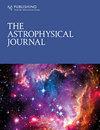A Hale-like Cycle in the Solar Twin 18 Scorpii
IF 5.4
2区 物理与天体物理
Q1 ASTRONOMY & ASTROPHYSICS
引用次数: 0
Abstract
Abstract Characterizing the cyclic magnetic activity of stars that are close approximations of our Sun offers our best hope for understanding our Sun’s current and past magnetism, the space weather around solar-type stars, and more generally, the dynamos of other cool stars. The nearest current approximation to the Sun is the solar twin 18 Scorpii, a naked-eye Sun-like star of spectral type G2 Va. However, while 18 Scorpii’s physical parameters closely match those of the Sun, its activity cycle is about 7 yr, and shorter than the solar cycle. We report the measurement of a periodicity of 15 yr that corresponds to a longer activity cycle for 18 Scorpii based on observations extending to the last three decades. The global magnetic geometry of 18 Scorpii changes with this 15 yr cycle and appears to be equivalent to the solar 22 yr magnetic polarity cycle. These results suggest that 18 Scorpii is also a magnetic proxy for a younger Sun, adding an important new datum for testing dynamo theory and magnetic evolution of low-mass stars. The results perturb our understanding of the relationship between cycle and rotation, constrain the Sun’s magnetism and the Sun–Earth connection over the past billion years, and suggest that solar Schwabe and Hale cycle periods have increased over that time span.太阳双星18天蝎座的海尔式周期
描述与太阳非常接近的恒星的周期性磁活动,为我们理解太阳当前和过去的磁性、太阳型恒星周围的空间天气,以及更普遍的其他冷恒星的发电机提供了最大的希望。目前最接近太阳的是太阳孪生星天蝎座18,一颗光谱类型为G2 Va的类太阳恒星。然而,虽然天蝎座18的物理参数与太阳非常接近,但它的活动周期约为7年,比太阳周期短。根据过去三十年的观测,我们报告了15年的周期测量,对应于18天蝎座的更长的活动周期。天蝎座18的全球磁性几何形状随着这15年的周期而变化,似乎相当于太阳22年的磁极周期。这些结果表明,天蝎座18也是年轻太阳的磁性代理,为测试发电机理论和低质量恒星的磁性演化提供了重要的新数据。这些结果扰乱了我们对周期和自转之间关系的理解,限制了过去十亿年来太阳的磁力和太阳与地球的联系,并表明太阳的施瓦贝和黑尔周期在这段时间内有所增加。
本文章由计算机程序翻译,如有差异,请以英文原文为准。
求助全文
约1分钟内获得全文
求助全文
来源期刊

Astrophysical Journal
地学天文-天文与天体物理
CiteScore
8.40
自引率
30.60%
发文量
2854
审稿时长
1 months
期刊介绍:
The Astrophysical Journal is the foremost research journal in the world devoted to recent developments, discoveries, and theories in astronomy and astrophysics.
 求助内容:
求助内容: 应助结果提醒方式:
应助结果提醒方式:


